- Home
- Patricia Briggs
Alpha and Omega Page 2
Alpha and Omega Read online
Page 2
“—I would normally have contacted the nearest pack. However, if Leo is murdering people, I don’t see how the other Chicago Alpha wouldn’t be aware of it. Since Jaimie hasn’t contacted me, I have to assume that both Alphas are involved to one degree or another.”
“It’s not Leo who’s making the werewolves,” she told him. “It’s Justin, his second.”
“The Alpha is responsible for the actions of his pack,” replied the Marrok coolly. “I’ve sent out an…investigator. As it happens he is flying into Chicago tonight. I’d like you to meet him.”
Which was how Anna ended up naked between a couple of parked cars in the middle of the night at O’Hare International Airport. She didn’t have a car or money for a taxi, but, as the crow flies, the airport was only about five miles from her apartment. It was after midnight and her wolf form was black as pitch and smallish as far as werewolves were concerned. The chances of someone seeing her and thinking she was anything but a stray dog were slight.
It had gotten colder, and she shivered as she pulled on the T-shirt she’d brought. There hadn’t been room in her small pack for her coat once she’d stuffed it with shoes, jeans, and a top—all of which were more necessary.
She hadn’t ever actually been to O’Hare before, and it took her a while to find the right terminal. By the time she got there, he was already waiting for her.
Only after she’d hung up the phone had she realized that the Marrok had given her no description of his investigator. She’d fretted all the way to the airport about it, but she needn’t have. There was no mistaking him. Even in the busy terminal, people stopped to look at him, before furtively looking away.
Native Americans, while fairly rare in Chicago, weren’t so unheard of as to cause all the attention he was gathering. None of the humans walking past him would probably have been able to explain exactly why they had to look—but Anna knew. It was something common to very dominant wolves. Leo had it, too—but not to this extent.
He was tall, taller even than Leo, and he wore his black, black hair in a thick braid that swung below his bead-and-leather belt. His jeans were dark and new-looking, a contrast to his battered cowboy boots. He turned his head a little and the lights caught a gleam from the gold studs he wore in his ears. Somehow he didn’t look like the kind of man who would pierce his ears.
The features under the youth-taut, teak-colored skin were broad and flat and carried an expression that was oppressive in its very blankness. His black eyes traveled slowly over the bustling crowd, looking for something. They stopped on her for a moment, and the impact made her catch her breath. Then his gaze drifted on.
CHARLES hated flying. He especially hated flying when someone else was piloting. He’d flown himself to Salt Lake, but landing his small jet in Chicago could have alerted his quarry—and he preferred to take Leo by surprise. Besides, after they’d closed Meigs Field, he’d quit flying himself into Chicago. There was too much traffic at O’Hare and Midway.
He hated big cities. There were so many smells that they clogged his nose, so much noise that he caught bits of a hundred different conversations without trying—but could miss entirely the sound of someone sneaking up behind him. Someone had bumped by him on the walkway as he left the plane, and he had to work to keep from bumping back, harder. Flying into O’Hare in the middle of the night had at least avoided the largest crowds, but there were still too many people around for his comfort.
He hated cell phones, too. When he’d turned his on after the plane had landed, a message from his father was waiting. Now instead of going to the car rental desk and then to his hotel, he was going to have to locate some woman and stay with her so that Leo or his other wolves didn’t kill her. All he had was a first name—Bran hadn’t seen fit to give him a description of her.
He stopped outside the security gates and let his gaze drift where it would, hoping instincts would find the woman. He could smell another werewolf, but the ventilation in the airport defeated his ability to pinpoint the scent. His gaze caught first on a young girl with an Irish-pale complexion, whiskey-colored curly hair, and the defeated look of someone who was beaten on a regular basis. She looked tired, cold, and far too thin. It made him angry to see it, and he was already too angry to be safe, so he forced his gaze away.
There was a woman dressed in a business suit that echoed the warm chocolate of her skin. She didn’t look quite like an Anna, but she carried herself in such a way that he could see her defying her Alpha to call the Marrok. She was obviously looking for someone. He almost started forward, but then her face changed as she found the person she was looking for—and it was not him.
He started a second sweep of the airport when a small, hesitant voice from just to his left said, “Sir, have you just come from Montana?”
It was the whiskey-haired girl. She must have approached him while he’d been looking elsewhere—something she wouldn’t have been able to do if he weren’t standing in the middle of a freaking airport.
At least he didn’t have to look for his father’s contact anymore. With her this close, not even the artificial air currents could hide that she was a werewolf. But it wasn’t his nose alone that told him that she was something far rarer.
At first he thought she was submissive. Most werewolves were more or less dominant. Gentler-natured people weren’t usually cussed enough to survive the brutal transformation from human to werewolf. Which meant that submissive werewolves were few and far between.
Then he realized that the sudden change in his anger and the irrational desire to protect her from the crowds streaming past were indications of something else. She wasn’t a submissive either, though many might mistake her for that: She was an Omega.
Right then he knew that whatever else he did in Chicago, he was going to kill whoever had given her that bruised look.
UP close he was even more impressive; she could feel his energy licking lightly over her like a snake tasting its prey. Anna kept her gaze fully on the floor, waiting for his answer.
“I am Charles Cornick,” he said. “The Marrok’s son. You must be Anna.”
She nodded.
“Did you drive here or catch a cab?”
“I don’t have a car,” she said.
He growled something she didn’t quite catch. “Can you drive?”
She nodded.
“Good.”
SHE drove well, if a little overcautiously—which trait he didn’t mind at all, though it didn’t stop him from bracing one hand against the dash of the rental. She hadn’t said anything when he told her to drive them to her apartment, though he hadn’t missed the dismay she felt.
He could have told her that his father had instructed him to keep her alive if he could—and to do that he had to stick close. He didn’t want to scare her any more than she already was. He could have told her that he had no intention of bedding her, but he tried not to lie. Not even to himself. So he stayed silent.
As she drove them down the expressway in the rented SUV, his wolf-brother had gone from the killing rage caused by the crowded airplane to a relaxed contentment Charles had never felt before. The two other Omega wolves he’d met in his long lifetime had done something similar to him, but not to this extent.
This must be what it was like to be fully human.
The anger and the hunter’s wariness that his wolf always held was only a faint memory, leaving behind only the determination to take this one to mate—Charles had never felt anything like that either.
She was pretty enough, though he’d like to feed her up and soften the stiff wariness in her shoulders. The wolf wanted to bed her and claim her as his own. Being of a more cautious nature than his wolf, he would wait until he knew her a little better before deciding to court her.
“My apartment isn’t much,” she said in an obvious effort to break the silence. The small rasp in her voice told him that her throat was dry.
She was frightened of him. Being his father’s chosen executioner, he was use
d to being feared, though he’d never enjoyed it.
He leaned against the door to give her a little more space and looked out at the city lights so she’d feel safe stealing a few glances at him if she wanted to. He’d been quiet, hoping she would get used to him, but he thought now that might have been a mistake.
“Don’t worry,” he told her. “I am not fussy. Whatever your apartment is like, it is doubtless more civilized than the Indian lodge I grew up in.”
“An Indian lodge?”
“I’m a little older than I look,” he said, smiling a little. “Two hundred years ago, an Indian lodge was pretty fancy housing in Montana.” Like most old wolves he didn’t like talking about the past, but he found he’d do worse than that to set her at ease.
“I’d forgotten you might be older than you look,” she said apologetically. She’d seen the smile, he thought, because the level of her fear dropped appreciably. “There aren’t any older wolves in the pack here.”
“A few,” he disagreed with her as he noted that she said “the pack” not “my pack.” Leo was seventy or eighty, and his wife was a lot older than that—old enough that they should have appreciated the gift of an Omega instead of allowing her to be reduced to this abased child who cringed whenever he looked at her too long. “It can be difficult to tell how old a wolf is. Most of us don’t talk about it. It’s hard enough adjusting without chatting incessantly about the old days.”
She didn’t reply, and he looked for something else they could talk about. Conversation wasn’t his forte; he left that to his father and his brother, who both had clever tongues.
“What tribe are you from?” she asked before he found a topic. “I don’t know a lot about the Montana tribes.”
“My mother was Salish,” he said. “Of the Flathead tribe.”
She snuck a quick look at his perfectly normal forehead. Ah, he thought, relieved, there was a good story he could tell her. “Do you know how the Flatheads got their name?”
She shook her head. Her face was so solemn he was tempted to make something up to tease her. But she didn’t know him well enough for that, so he told her the truth.
“Many of the Indian tribes in the Columbia Basin, mostly other Salish peoples, used to flatten the foreheads of their infants—the Flatheads were among the few tribes that did not.”
“So why are they the ones called Flatheads?” she asked.
“Because the other tribes weren’t trying to alter their foreheads, but to give themselves a peak at the top of their heads. Since the Flatheads did not, the other tribes called us ‘flat heads.’ It wasn’t a compliment.”
The scent of her fear faded further as she followed his story.
“We were the ugly, barbarian cousins, you see.” He laughed. “Ironically, the white trappers misunderstood the name. We were infamous for a long time for a practice we didn’t follow. So the white men, like our cousins, thought we were barbarians.”
“You said your mother was Salish,” she said. “Is the Marrok Native American?”
He shook his head. “Father is a Welshman. He came over and hunted furs in the days of the fur trappers and stayed because he fell in love with the scent of pine and snow.” His father put it just that way. Charles found himself smiling again, a real smile this time and felt her relax further—and his face didn’t hurt at all. He’d have to call his brother, Samuel, and tell him that he’d finally learned that his face wouldn’t crack if he smiled. All it had taken to teach him was an Omega werewolf.
She turned into an alley and pulled into a small parking lot behind one of the ubiquitous four-story brick apartment buildings that filled the older suburbs of this part of town.
“Which city are we in?” he asked.
“Oak Park,” she said. “Home of Frank Lloyd Wright, Edgar Rice Burroughs, and Scorci’s.”
“Scorci’s?”
She nodded her head and hopped out of the car. “The best Italian restaurant in Chicago and my current place of employment.”
Ah. That’s why she smelled of garlic.
“So your opinion is unbiased?” He slid out of the car with a feeling of relief. His brother made fun of his dislike of cars since even a bad accident was unlikely to kill him. But Charles wasn’t worried about dying—it was just that cars went too fast. He couldn’t get a feel for the land they passed through. And if he felt like dozing a bit as he traveled, they couldn’t follow the trail on their own. He preferred horses.
After he got his suitcase out of the back, Anna locked the car with the key fob. The car honked once, making him jump, and he gave it an irritated look. When he turned back, Anna was staring hard at the ground.
The anger that being in her presence had dissipated surged back full force at the strength of her fear. Someone had really done a number on her.
“Sorry,” she whispered. If she’d been in wolf form she’d have been cowering with her tail tucked beneath her.
“For what?” he asked, unable to banish the rage that sent his voice down an octave. “Because I’m jumpy around cars? Not your fault.”
He was going to have to be careful this time, he realized as he tried to pull the wolf back under control. Usually when his father sent him out to deal with trouble, he could do it coldly. But with a damaged Omega wolf around, one that he found himself responding to on several different levels, he was going to have to hold tight to his temper.
“Anna,” he said, fully in control again. “I am my father’s hit man. It is my job as his second. But that doesn’t mean that I take pleasure in it. I am not going to hurt you, my word on it.”
“Yes, sir,” she said, clearly not believing him.
He reminded himself that a man’s word didn’t count for much in this modern day. It helped his control that he scented as much anger on her as fear—she hadn’t been completely broken.
He decided that further attempts to reassure her were likely to do the opposite. She would have to learn to accept that he was a man of his word. In the meantime he would give her something to think about.
“Besides,” he told her gently, “my wolf is more interested in courting you than in asserting his dominance.”
He walked past her before he smiled at the way her fear and anger had disappeared, replaced by shock…and something that might have been the beginning of interest.
She had keys to the outer door of the building and led the way through the entry and up the stairs without looking at him at all. By the second flight her scent had dulled of every emotion besides weariness.
She was visibly dragging as she climbed the stairs to the top floor. Her hand shook as she tried to get her key into the deadbolt of one of the two doors at the top. She needed to eat more. Werewolves shouldn’t let themselves get so thin—it could be dangerous to those around them.
HE was an executioner, he said, sent by his father to settle problems among the werewolves. He must be even more dangerous than Leo to have survived doing that job. She could feel how dominant he was, and she knew what dominants were like. She had to stay alert, ready for any aggressive moves he might make—ready to handle the pain and the panic so she didn’t run and make him worse.
So why was it that the longer he was around, the safer he made her feel?
He followed her up all four flights of stairs without a word, and she refused to apologize again for her apartment. He’d invited himself, after all. It was his own fault that he’d end up sleeping on a twin-size futon instead of a nice hotel bed. She didn’t know what to feed him—hopefully he’d eaten while he traveled. Tomorrow she’d run out and get something; she had the check from Scorci’s on her fridge awaiting deposit in the bank.
There had once been a pair of two-bedroom apartments on her floor, but in the seventies someone had reapportioned the fourth floor into a three-bedroom and her studio.
Her home looked shabby and empty, with no more furniture than her futon, a card table, and a pair of folding chairs. Only the polished oak floor gave it any appeal.
She glanced at him as he walked through the doorway behind her, but his face revealed very little he didn’t want it to. She couldn’t see what he thought, though she imagined his eyes lingered a little on the futon that worked fine for her, but was going to be much too small for him.
“The bathroom’s through that door,” she told him unnecessarily, as the door stood open and the bathtub was clearly visible.
He nodded, watching her with eyes that were opaque in the dim illumination of her overhead light. “Do you have to work tomorrow?” he asked.
“No. Not until Saturday.”
“Good. We can talk in the morning, then.” He took his small suitcase with him into the bathroom.
She tried not to listen to the unfamiliar sounds of someone else getting ready for bed as she rummaged in her closet for the old blanket she kept in it, wishing again for a nice cheap carpet instead of the gleaming hardwood floor that was pretty to look at, but cold on bare feet and sure to be hard on her backside when she tried to sleep.
The door opened while she was kneeling on the floor, folding the blanket into a makeshift mattress as far as she could from where he would be sleeping. “You can take the bed,” she began as she turned around and found herself at eye level with a large reddish-brown werewolf.
He wagged his tail and smiled at her obvious surprise before brushing past her and curling up on the blanket. He wiggled a bit and then put his head down on his forepaws and closed his eyes, to all appearances dropping off immediately to sleep. She knew better, but he didn’t stir as she went into the bathroom herself or when she came out dressed in her warmest pair of sweats.
She wouldn’t have been able to sleep with a man in her apartment, but somehow, the wolf was less threatening. This wolf was less threatening. She bolted the door, turned out the light, and crawled into bed feeling safer than she had since the night she’d found out that there were monsters in the world.

 Wolfsbane
Wolfsbane When Demons Walk
When Demons Walk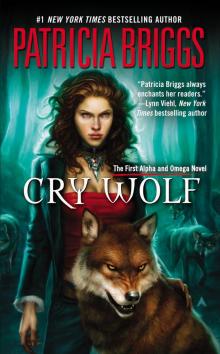 Cry Wolf
Cry Wolf On the Prowl
On the Prowl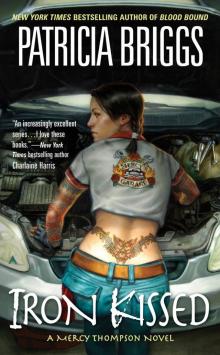 Iron Kissed
Iron Kissed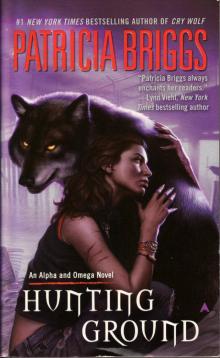 Hunting Ground
Hunting Ground Patricia Briggs Mercy Thompson: Hopcross Jilly
Patricia Briggs Mercy Thompson: Hopcross Jilly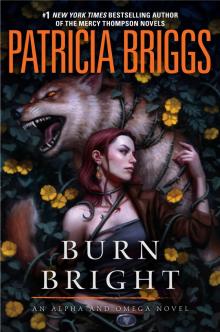 Burn Bright
Burn Bright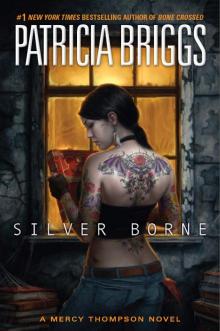 Silver Borne
Silver Borne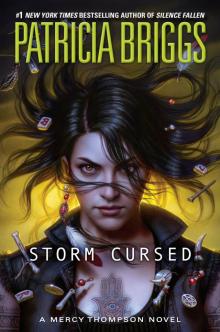 Storm Cursed
Storm Cursed Shifting Shadows
Shifting Shadows Frost Burned
Frost Burned River Marked
River Marked Silence Fallen
Silence Fallen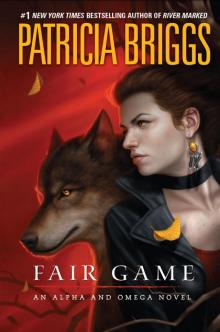 Fair Game
Fair Game Moon Called
Moon Called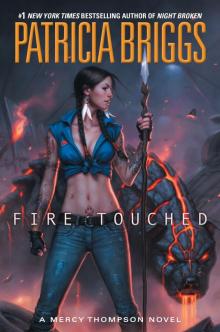 Fire Touched
Fire Touched Dead Heat
Dead Heat Blood Bound
Blood Bound Dragon Bones
Dragon Bones Night Broken
Night Broken The Hobs Bargain
The Hobs Bargain Ravens Shadow
Ravens Shadow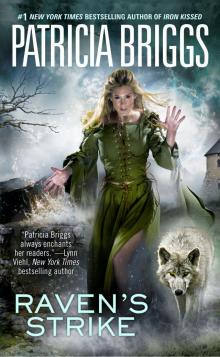 Ravens Strike
Ravens Strike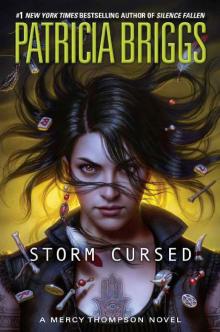 Storm Cursed (A Mercy Thompson Novel)
Storm Cursed (A Mercy Thompson Novel) Bone Crossed
Bone Crossed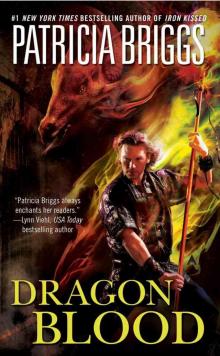 Dragon Blood
Dragon Blood Smoke Bitten: Mercy Thompson: Book 12
Smoke Bitten: Mercy Thompson: Book 12 Smoke Bitten
Smoke Bitten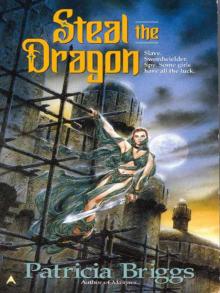 Steal the Dragon
Steal the Dragon 0.5 On The Prowl (alpha and omega)
0.5 On The Prowl (alpha and omega) Alpha and Omega
Alpha and Omega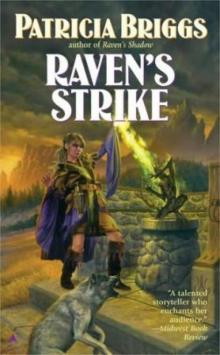 Raven's Strike rd-2
Raven's Strike rd-2![[Mercy 03] - Iron Kissed Read online](http://i1.bookreadfree.com/i/03/24/mercy_03_-_iron_kissed_preview.jpg) [Mercy 03] - Iron Kissed
[Mercy 03] - Iron Kissed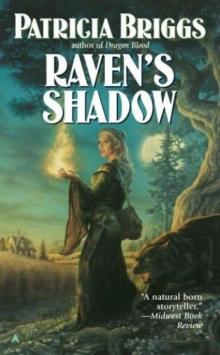 Raven's Shadow rd-1
Raven's Shadow rd-1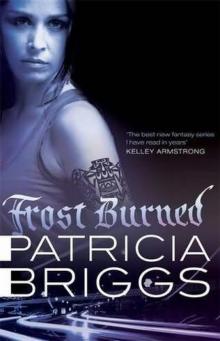 Frost Burned mt-7
Frost Burned mt-7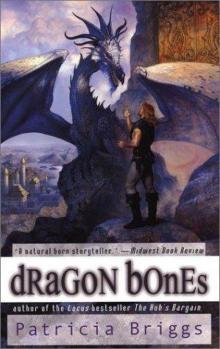 Dragon Bones h-1
Dragon Bones h-1 Shifting Shadows: Stories from the World of Mercy Thompson
Shifting Shadows: Stories from the World of Mercy Thompson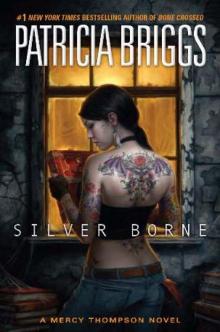 Silver Borne mt-5
Silver Borne mt-5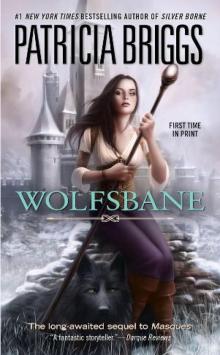 Wolfsbane s-2
Wolfsbane s-2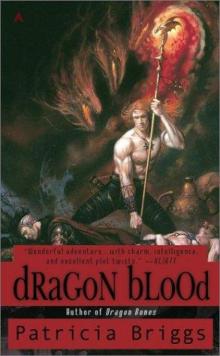 Dragon Blood h-2
Dragon Blood h-2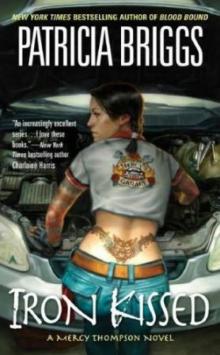 Iron Kissed mt-3
Iron Kissed mt-3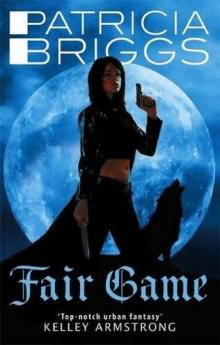 Fair Game aao-3
Fair Game aao-3 Masques s-1
Masques s-1![[Hurog 01] - Dragon Bones Read online](http://i1.bookreadfree.com/i1/04/03/hurog_01_-_dragon_bones_preview.jpg) [Hurog 01] - Dragon Bones
[Hurog 01] - Dragon Bones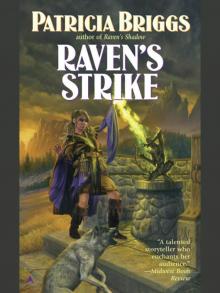 Raven s Strike
Raven s Strike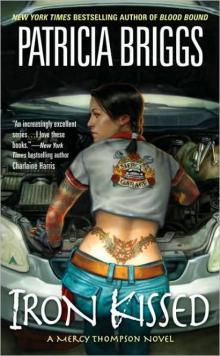 Mercedes Thompson 03: Iron Kissed
Mercedes Thompson 03: Iron Kissed Bone Crossed mt-4
Bone Crossed mt-4 Blood Bound mt-2
Blood Bound mt-2![[Mercy 01] - Moon Called Read online](http://i1.bookreadfree.com/i2/04/09/mercy_01_-_moon_called_preview.jpg) [Mercy 01] - Moon Called
[Mercy 01] - Moon Called River Marked mt-6
River Marked mt-6 The Mercy Thompson Collection
The Mercy Thompson Collection Moon Called mt-1
Moon Called mt-1 Mercy Thompson 8: Night Broken
Mercy Thompson 8: Night Broken